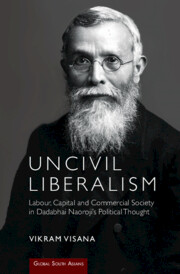Book contents
- Frontmatter
- Dedication
- Contents
- List of Abbreviations
- Acknowledgements
- Introduction
- 1 Sociality in an Imperial and Industrial Age
- 2 Sociality and the Parsis of Western India
- 3 Civil Society and Social Reform
- 4 Conceptualizing the Drain Theory
- 5 Making Commercial Society in India
- 6 Making Commercial Society in Britain
- 7 The Afterlives of Naoroji’s Political Thought
- Conclusion
- References
- Index
3 - Civil Society and Social Reform
Published online by Cambridge University Press: 27 September 2022
- Frontmatter
- Dedication
- Contents
- List of Abbreviations
- Acknowledgements
- Introduction
- 1 Sociality in an Imperial and Industrial Age
- 2 Sociality and the Parsis of Western India
- 3 Civil Society and Social Reform
- 4 Conceptualizing the Drain Theory
- 5 Making Commercial Society in India
- 6 Making Commercial Society in Britain
- 7 The Afterlives of Naoroji’s Political Thought
- Conclusion
- References
- Index
Summary
In February 1885, Naoroji commemorated the life and legacy of the recently deceased Parsi philanthropist Kharshedji Nasarvanji Cama, who had bankrolled a number of Naoroji's reform and educational organizations in Bombay during the 1840s and 1850s. Reminiscing about what prosperous Parsi reformers achieved in these times and the type of civil society they had promoted, Naoroji remarked that ‘the state of society’ before these philanthropic efforts had appeared decidedly ‘peculiar’. Liberal education subsequently opened the minds of young men to ‘new ideas and thoughts’ about their ‘social and … other duties and relations’. These pioneering professionals backed with money from wealthy Parsi businesses had challenged the traditional hierarchies of priestly, patriarchal and panchayati obligation. By the 1860s the panchayat seemed to epitomize all the community's illiberal traits, monopolized as it was by conservative orthodox families that sought to use their influence to arbitrarily arrest the pace of change. As far as Naoroji was concerned, it was the ‘moral’ and ‘self-bondage’ of his co-religionists that enabled these forms of domination.
Anxieties around cultural and moral bondage animated the social reform agenda of Naoroji and his colleagues from the 1840s to the 1860s. First, the panchayat's status-based monopoly of what constituted the legitimate parameters of Parsi social conduct came under increased scrutiny as community notables discredited themselves through scandal and corruption. Second, communal rioting in Bombay revealed the fragility of the city's social concord, prompting a search for ways to maintain inter-communal harmony. The Victorian character discourse was reconfigured in this context to promote individual self-regulation and self-restraint through a programme of liberal tutelage. However, given the desire of Indian communities to preserve their cultural distinctiveness, this was to be executed in accordance with the life-worlds of respective religious groups. Because cultural backsliding was associated with the exercise of arbitrary power by orthodox elites, Naoroji and his allies’ account of liberty and society developed a republican inflection.
As guardians of the domestic sphere, Indian women emerged as the lynchpin of the new social order with female uplift seen as a way of inculcating rational self-fashioning and self-reliance among future generations. This chapter also explains how female education was aligned with projects of cultural uplift that sought to inculcate self-mastery using the didactic pedagogy of Parsi, Hindu and Muslim cultures.
- Type
- Chapter
- Information
- Uncivil LiberalismLabour, Capital and Commercial Society in Dadabhai Naoroji's Political Thought, pp. 72 - 96Publisher: Cambridge University PressPrint publication year: 2022



